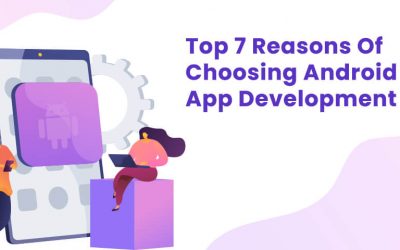
Table of Content
- It Delivers Greater Performance
- It Provides Quicker App Development
- It Looks Native
- You Can Work On A Limited Budget
- It Offers Plug-ins From Third Parties
Cross-platform development is the new cool thing among developers worldwide and it is unthinkable to not acknowledge React Native for Mobile App Development. Businesses should not overlook the value of a mobile app as the number of people using smartphones grows with each passing day and apps are the most efficient way to expand your business. It enables your organization to reach a large group of individuals and increase revenue. So let’s understand how React Native can be used to build Mobile apps.
React Native, which began as an internal project at Facebook (now Meta), has emerged as the most widely used option for cross-platform mobile development. It is a JavaScript-based mobile app creation framework that is open source. This framework is trendy among app developers because it enables them to create mobile apps with a native look and feel for both iOS and Android devices. Instagram, Walmart, Airbnb, Tesla, and a plethora of other Fortune 500 companies have built mobile apps with the React Native framework. Statista reports that 42% of mobile app developers favor React Native for cross-platform mobile applications.
5 reasons why you should choose React Native for mobile app development.
It Delivers Greater Performance
React Native makes use of GPU (Graphics Processing Unit), which offers greater speed and efficiency. Many individuals still believe that there is no replacement for the performance provided by native apps. React Native, on the other hand, performs well almost as effectively as native solutions. Among the reasons, you should consider using React Native over WebView-based tools is its incredible performance, which helps to attain 60 frames a second.
It Provides Quicker App Development
React Native is in existence for almost a decade. During this time, it has built a strong online supportive community that is growing on a daily basis. This also implies that several relevant components are already accessible for developers to use. It means you won’t have to start from square one. Using only a single piece of code significantly reduces the likelihood of discovering bugs in the development of a React Native app. This means you can quickly build the Minimum Viable Product (MVP) and release the first prototype of your app. Rather than wasting time and resources on developing detailed interfaces, you can simply build the extra features you wish to include.
It Looks Native
This assures that the apps you create not only work and look like native apps, but also have a substantially enhanced user experience (UX). Because React Native uses the same UI for both iOS and Android, customers can expect the app to look and operate identically on both platforms. Additionally, developers can use a mishmash of React and native code to further improve the native-like design and functionality of their mobile applications.
You Can Work On A Limited Budget
We’ve already observed that React Native apps can be built much quicker than separate Android and iOS apps. While saving time is an immediate benefit of using React Native, another notable advantage is saving money. When a small start-up is just getting off the ground, you need to get the most bang for your buck. Rather than hiring separate iOS and Android developers, they can reroute those resources to recruit a skilled React developer. While cross-platform options are available, developers agree that they do not offer the best UX.
It Offers Plug-ins From Third Parties
There are numerous reusable libraries for React Native publicly available, and the number rises over time. It can take a long time and cash to create an app entirely from scratch, especially with an original software framework. This hurdle can be conquered by reusing a number of the existing components. Third-party plugins come into play here. You are not required to use specific Web View functions with all these third-party plugins. The plugin can be linked to a native module using React Native. There are several methods for linking the processes and these options play a part in smoother operation and faster loading.

To Sum It Up
When it comes to cross-platform mobile app development, React Native is indeed the real deal. React Native for mobile app development supports the creation of high-quality and stable apps for both iOS and Android. It is a fantastic tool for developing mobile apps. It is simpler to build, has higher quality, continues to support third-party plugins, and so forth. Your team will not be required to spend endless hours analyzing two different codebases with React Native. A single bug fix eliminates bugs in all operating systems simultaneously, permitting you to consistently deliver across all platforms. So, if you want to develop a mobile application and propel your organization forward. React Native may be the safest bet for you.
Read More: Top 10 Reasons to Choose React Native Over Other App Development Platforms

















